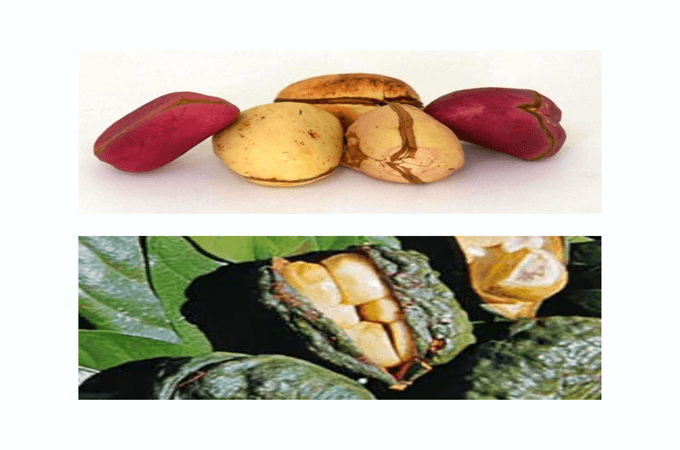In the Igbo culture the kola nut also called “Ọjị” in Igbo is an important cultural and symbolic significance. Origins: A tropical African native, kola nut is more than a stimulant or plant; it is a building block of Igbo identity, a base for articulation, union, and spirituality. Its utility, from rituals to social gatherings, embodies the values and customs of the Igbo people.
The symbolism of the Kola Nut
The kola nut isn’t a common fruit; it’s a sacred object among the Igbo. It represents hospitality, respect and goodwill. The kola nut is presented and shared during ceremonies as a symbol of unity and mutual understanding. The presence of the guest conveys peace, hospitality, sacredness of a session that starts, a sacred link between the guide and the searcher. In Igbo culture, the kola nut is hailed as “the king of all fruits”.
Rituals and Traditions
Kola nut is vey important in Igbo rites. Traditionally, before any fruitful discussion and of course an event, a presentation and blessing of the kola nut is done. We place the broken kola nut and pray to the ancestors and the divine for communion, blessings, and guidance. This ceremonial practice highlights the spiritual significance of the kola nut, bridging the living with their ancestral line and the spiritual world.
The kola nut is an important part of traditional ceremonies: marriage, funerals, title-taking, and communal gathering. The blessing and distribution of the event indicates the formalization of the event, allowing all movements in accordance. Offering and receiving the nut both expresses hierarchy and respect in the community.
Social Significance
The kola nut promotes social bonding and discourse. The kola nut is a sign of an open heart and good intentions, and in meetings or other informal visits presenting one in front of your host is the preferred way to greet them. When the kola nut is presented to the guests, they are expected to respond with gratitude, beginning a cycle of goodwill.
The kola nut often plays peacemaker in conflicts. You serve it during reconciliations as an expression of willingness to work through disagreements. By cracking and sharing the kola nut, parties affirm their resolve to restore harmony.
Cultural Practices and Etiquette
There are customs and practices associated with the kola nut. (Qi is typically offered two-handed, as an expression of respect and reverence.) Unlike many foods that can be shared, only a man— usually the oldest or most honored one in the room—has the power to split the kola nut. This act is traditionally not performed by women except in certain cases. Also, the prayers that emerge as the kola nut breaks are often for peace, prosperity, and unity.
The number of lobes (“akụ”) in a kola nut is also significant. A nut with four lobes, for example, is thought to be especially auspicious, as it represents the united blessings of all directions. An odd-numbered kola nut is interpreted as being a sign of divine favour and is particularly valued in rituals.
Modern-Day Relevance
Though modernization has introduced changes in some traditional practices, the kola nut is still an essential representation of Igbo identity. Even within cities, the rituals around the kola nut endure in marriages, meetings and religious ceremonies. Its role as a bridge between generations and custodian of cultural heritage is what keeps it relevant.
In Igbo culture the kola nut (Ọjị) is no ordinary fruit; it is a sacred symbol of spiritual unity and respect. It features prominently in rituals, social gatherings and conflict resolution, all of which point to its significance in culture. The symbolism and significance of kola nut among the Igbo tribe gives us further understanding of the values and traditional practices of the Igbo people. The Ọjị thus has a markedly contemporary dimension: it is not merely an artifact of the past, but a practice that persists in shaping the present and the future.
